- Home
- Simon Beckett
The Restless Dead Page 3
The Restless Dead Read online
Page 3
‘You think Leo Villiers killed her?’
The DI hitched a shoulder in a shrug. ‘We never found her body so we couldn’t prove anything. But he was the only serious suspect. She was a photographer, moved out here from London two or three years back when she got married. Emma Derby – glamorous, very attractive. Not the type you’d expect to find somewhere like this. Villiers hired her to do his publicity photographs when he looked like going into politics, and then commissioned her to do some interior design for his house. Turns out that wasn’t all she did, because his housekeeper and gardener both claim they saw a half-dressed woman fitting Derby’s description in his bedroom.’
Pursing his mouth disapprovingly, Lundy patted his pockets and took out a packet of antacids. He popped a couple from the foil strip.
‘Looks like they had a falling out, though,’ he said, chomping the tablets. ‘We’ve got several witnesses who heard her ranting and calling him an “arrogant prick” at some swanky political bash not long before she vanished.’
‘Did you question him?’
‘For all the good it did. He denied having an affair, reckoned she’d thrown herself at him but he’d turned her down. Hard to believe given his track record, especially when he didn’t have an alibi for the day she went missing. Claimed he was away but wouldn’t say where or offer anything to corroborate it. He was obviously hiding something, but the family’s lawyers were throwing up every obstacle they could. Threatened to sue for harassment if we so much as looked askance at him, and without a body or evidence there wasn’t much we could do. We searched the area around where Emma Derby and her husband lived, but it’s mainly saltmarsh and mudflats you can’t get to on foot. Ideal place to get rid of a body. Hellish to search, so finding anything in there was always going to be a tall order. And then Leo Villiers went missing himself, so that was pretty much that.’
I thought back to what Lundy had said on the phone the night before. ‘You said his disappearance wasn’t suspicious, but someone like that must have made enemies. What about Emma Derby’s husband?’
‘Oh, we took a good look at him. Bit of an unlikely match, to be honest. He was a good bit older than her, and it was no secret they were having difficulties even before she hooked up with Villiers. But he was out of the country when his wife went missing and then up in Scotland when her boyfriend disappeared. His alibis checked out both times.’ Lundy turned down the corners of his mouth. ‘You’re right about Villiers having enemies, and I dare say not many people will shed a tear over him. But there’s nothing to suggest any of them were involved, or that there was anything suspicious about it. There was a report that the gardener scared off a prowler from the grounds of his house not long before he disappeared, but that was more likely just local teenagers.’
I looked out beyond the oyster sheds to where the muddy estuary bed was disappearing under the returning water. ‘So you think Villiers killed himself?’
The DI’s caginess on the phone had made me think this was something more than an accident. Lundy shrugged. ‘He’d been under a lot of pressure and we know he had at least one failed suicide attempt in his teens. Sir Stephen’s lawyers have been blocking us from seeing his medical records, but going on verbal accounts from people who knew him there was obviously a history of depression. And there was a note.’
‘A suicide note?’
He looked pained. ‘We’re not officially calling it that. Sir Stephen won’t have anyone suggesting his son killed himself, so we’re having to tread carefully. And the note was found in Leo’s bin, so either it was a draft or he changed his mind about leaving it. But it was his handwriting, saying he couldn’t carry on. Hated his life, that sort of thing. And the housekeeper who found the note told us his shotgun was missing as well. Handmade by Mowbry and Sons. You heard of them?’
I shook my head: I was more familiar with the effects of shotguns than with their manufacturers.
‘They’re up there with Purdeys when it comes to bespoke shotguns. Beautiful craftsmanship, if you like that sort of thing, and phenomenally expensive. Villiers’ father bought it for him when he turned eighteen. Must have cost nearly as much as my house.’
A cheaper gun would have been just as lethal. But I was starting to understand why Lundy had been wary about saying too much earlier. Suicide was a difficult thing for any family to process, especially of a man suspected of murder. It would be a doubly hard blow for any parent to accept, so it was no wonder that Sir Stephen Villiers was in denial. What set him apart was that he had the money and power to enforce it.
That might be harder if this was his son’s body.
The distant speck of the helicopter was still visible, although now the wind was carrying its sound away from us. It seemed to have stopped moving.
‘What makes you think this is Villiers rather than Emma Derby?’ I asked. I doubted the yachtsmen who’d seen the drifting body would have been able to tell its gender.
‘Because she went missing seven months ago,’ Lundy said. ‘Can’t see her body just turning up after all this time.’
He was right. Although a body would initially sink once any air trapped in its lungs had escaped, it would float back to the surface if the build-up of gases from decomposition made it buoyant again. When that happened it could drift for weeks, depending on the temperature and conditions. But seven months was too long, especially in the relatively shallow waters of an estuary. The combination of tides, marine scavengers and hungry seabirds would have taken its toll long before then.
Even so, there was still something about this I wasn’t getting. I ran through what Lundy had said, trying to put it together. ‘So Leo Villiers didn’t go missing until six months after Emma Derby disappeared?’
‘Around that, although we’re not sure exactly when. There’s a two-week gap between the last time anyone had any contact with him and when he was reported missing, but we’re fairly sure that—’
The DI broke off as a whistle came from the direction of the quayside. One of the marine unit had emerged from behind the oyster sheds. He held up a thumb before turning and heading back.
Lundy shook the last few drops of tea from his cup. ‘Hope you’re ready to get your feet wet, Dr Hunter,’ he said, screwing it back on to the thermos. ‘Looks like the helicopter’s found something.’
3
SALT SPRAY STUNG my face as the RHIB heeled over to one side. I wiped it from my eyes, gripping the edge of my seat as we skimmed over the water. The estuary wasn’t particularly rough but we were heading against the tide and wind. The boat juddered as its bow smacked into successive waves, each one sending a curtain of cold spume into the open cockpit.
It was fully light now, although the sun was no more than a diffuse glow in the overcast sky. The smell of plastic from the boat’s hull mixed with diesel fumes and salt-soaked rope. The marine unit sergeant stood at the controls, riding the waves easily as he gripped the small wheel. I sat behind him with Lundy and three other life-jacketed officers from the marine unit. The boat was cramped. The six of us shared it with a stretcher and two piles of aluminium stepping plates, set either side of the boat so as not to unbalance it.
I was jerked in my seat as the boat hit a wave head on. Lundy gave me a smile, his glasses flecked with water. ‘You all right, there?’ he shouted above the noise of the wind and engine. ‘Shouldn’t be much longer!’
I nodded. I’d sailed when I was younger, and normally the choppy ride wouldn’t have bothered me. It wasn’t helping the vaguely washed-out feeling I’d woken with, but I tried to put it from my mind. I’d been given a lifejacket to wear as well, this one bright orange rather than the dark blue of the marine unit’s. My chest-high rubber waders were uncomfortable to sit in, as were the waterproof coveralls I wore underneath. Still, looking at the estuary’s muddy banks on either side, I knew I’d be glad of them later.
The tide had returned with surprising speed. By the time I’d changed and collected my flight case of equipment from the
car, the marine unit were already manhandling the boat down the slipway and off the trailer. The channel in front of the quayside was almost completely flooded, water slopping around the concrete ramp as the estuary’s mud and shingle disappeared under the encroaching sea.
‘We’re not going to have much time,’ Lundy had warned me as we’d stood by the slipway. ‘The helicopter says the body’s grounded partway up a sandbank, but it won’t stay there long. The tide here comes in quicker than a man can run, so we’ll need to work fast.’
Very fast, by the sound of it. This was going to be a race to recover the body before the returning tide floated it off again, which made me question even more why I was there. Although I preferred to examine remains in situ given the chance, there wasn’t going to be much time to do that here. The priority would be to retrieve the body as quickly as possible, and Lundy and the marine unit were perfectly capable of doing that by themselves.
I stared over the RHIB’s blunt bow as we reached the deeper water in the middle of the estuary and then headed out towards the Barrows. The sandbanks lay dead ahead, a natural barrier stretching almost from shore to shore. They’d been isolated by the rising tide but they were still exposed, smooth brown humps emerging from the water like a pod of beached whales. Beyond them, where the estuary met the open sea, I could see three strange-looking structures rising from the water. They were too far away to make out any detail, but from the pitching boat they looked like square boxes perched on pyramidal stilts. Oil derricks, perhaps, although they seemed too close to the shore for that.
Lundy saw me looking. ‘It’s a sea fort.’
‘A what?’
We had to yell above the din of the engine. ‘A Maunsell sea fort. The army and Navy built them along the coast during the Second World War to keep German ships out of the estuaries. This is an army one. It used to have seven towers all linked by walkways, but these three are all that’s left.’
‘Is it still in use?’ I shouted. Lundy said something but it was lost in the wind and noise. I shook my head. He leaned closer.
‘I said only by seagulls. None of the army forts are. A few of them were used by pirate radio stations back in the sixties, like the one here and at Red Sands in the Thames estuary. But most were either dismantled or fell down years ago. There was talk about turning this one into a hotel a while back, but nothing came of it.’ Lundy shook his head at the thought of such folly. ‘Can’t say I’m surprised. I wouldn’t want to stay there.’
Neither would I, but we were almost at the Barrows so I gave up attempting any more conversation after that. It became blessedly quieter as the RHIB throttled down, slowing to make its approach. It was possible to hear the chop of the helicopter now. It hovered ahead of us, lights winking as it held station above the body.
The marine unit sergeant eased the RHIB between the sandbanks. They rose up like small islands all around, waves lapping at their smooth sides. It wouldn’t be much longer before the rising tide covered them, and I understood what Lundy had meant about the Barrows making the estuary all but impassable. It was hard enough negotiating them even when they could be seen above the surface. Hidden by the high tide they’d be treacherous.
We were almost directly under the helicopter now. The wash from its rotors was deafening, buffeting us and flattening the water’s surface.
‘There it is.’
Lundy pointed at something ahead of us, but I couldn’t see past his bulky figure. Then the RHIB slowed and came around, and I had my first sight of the body. The tide had deposited it partway up the muddy slope of a sandbank, a sodden mess of clothing slumped in the stillness only the inanimate and the dead can achieve. It lay face down with its head nearest the water and its legs and feet trailing up the sandbank, angled away from us. As I watched, a gull landed nearby, but after hopping closer to examine the body it lost interest.
I knew then this was no recent drowning.
Lundy spoke into his radio, raising a hand in acknowledgement as the helicopter rose up and banked away. Our momentum carried us forward as the boat’s engine was cut, and in the sudden silence there was a bump as we ran aground. Intent on the body, I began to climb out of the boat. The sandbank looked solid enough but it had the gelid, grainy consistency of wet mortar. I almost overbalanced as my leg sank in up to my knee.
‘Careful there,’ Lundy said, grabbing my arm. ‘Best wait till we’ve got the stepping plates down. You’ve got to watch yourself on this stuff or you’ll be in up to your waist.’
‘Thanks,’ I said, embarrassed. I tugged my foot free, glad of the waders. I could see now why the police hadn’t wanted to winch anyone down from the helicopter. It would have been impossible to recover the body that way without getting stuck.
The marine unit officers began laying down stepping plates on the sandbank, making a path up to the body. The metal plates sank under our weight, water squeezing up around their edges. They were soon smeared and slippery, but it was better than trying to walk across the wet sand.
I stayed back while they worked, noting the haphazard arrangement of limbs. The tide had deposited the body face down, in the same position as it would have been floating. It wore a long, dark coat of waxed cotton or some similar stiff material, caked in mud and ballooned by the air still trapped inside. One arm was by its side while the other was draped across its head in apparent abandon.
Even from where I stood I could see that the hands and feet were missing.
‘I’d like to take a look before we move it,’ I said to Lundy when the officers finished laying the plates. He gave a nod.
‘It’ll have to be quick. Another few minutes and this is going to be underwater.’
He was right. Despite his earlier warning I was still surprised by how fast the tide was returning. Waves were already snapping at our heels; in the time it had taken to lay the stepping plates the water level had kept pace with us, rising more than halfway up the sandbank’s slope.
Careful not to slip on the muddy plates, I picked my way up to the body. It looked a forlorn thing lying there, like something discarded and thrown away. Another gull hopped towards it, leaving arrowhead-shaped prints in the wet sand. It launched itself into the air and flapped away, cawing in protest as I approached. More of them wheeled above us in the zinc-coloured sky, but like the lone seabird I’d seen earlier, none paid any attention to what lay on the sandbank. That said a lot about its condition. If voracious scavengers like gulls weren’t interested then it must be badly decomposed.
That was confirmed a moment later when the wind shifted, and the rank odour of rotting animal tissue polluted the salty tang. I stopped a few feet away and studied the body. Even lying crumpled as it was, in life this would have been a taller than average individual. That made it more likely to be male, although not certain: it could be an unusually tall woman. Most of the head was concealed by the long coat, which had bunched up over it like a hood, so only a few sparse strands of sand-clogged hair were visible above the collar.
I crouched down for a better look. Blunt stumps of pallid bone and gristle emerged from the trouser bottoms, while the forearms ended at the wrists. A gold watch was embedded in the swollen flesh of one of them. There were no signs of the missing hands or feet on any of the nearby sandbanks, but I’d have been surprised if there had been. Although this wouldn’t be the first body I’d encountered where the hands had been removed to prevent identification, I couldn’t see any obvious damage to the bones of the wrists and ankles here to suggest they’d been severed. With no clothing to protect them, the hands and feet would have simply fallen away as the connective tissue of the joints decomposed.
I took my camera from the bib pocket of my waders and began taking photographs. I didn’t hear Lundy approach until he spoke.
‘You can have copies of our video.’
I glanced round: he moved lightly for a big man, even on the metal plates. ‘Thanks, but I’ll take a few of my own anyway.’
I usually did: that wa
y I’d only have myself to blame if I missed anything. Lundy stood looking down at the body. ‘Male, by the look of things. Must have been in the water a while to lose its hands and feet. Fits with how long Leo Villiers has been missing, wouldn’t you say?’
I’d been waiting for him to ask. Normally, estimating a time-since-death was something of a speciality of mine. I’d trained at the original body farm in Tennessee, where human cadavers were used for controlled experiments into decomposition. I’d learned how to establish when an individual had died, assessing bacterial activity and the degree of putrefaction, using esoteric formulae to analyse the breakdown of a body’s volatile fatty acids. I could say without conceit that I understood as well as most forensic entomologists the life cycle of blowflies, and the way different insects will colonize a rotting corpse. And while I still preferred to call it experience rather than instinct, over the years being able to accurately judge such things had become second nature.
But that was on land. On land a body would stay in one place, and nature cooperated by providing obligingly measurable criteria. Water was different. While there was no shortage of aquatic scavengers, there wasn’t a water-based equivalent of a blowfly, whose life cycle provided a convenient stopwatch to gauge time-since-death. And a floating body would move, changing depths and therefore temperature as it was subjected to tides and currents. The situation was even more complex in an estuary like this, where river met sea and marine and freshwater ecosystems converged.
I looked down at the body. Except for the gnarled joints of the wrists and ankles the coat covered most of it. Still, I could see enough. ‘In these conditions it wouldn’t take long for the hands and feet to detach, even at this time of year. So probably, yes …’
At the last second I stopped myself from adding but. Four to six weeks was certainly long enough for the hands and feet to drop away in shallow tidal waters like this. That wasn’t what bothered me, but I didn’t want to say anything until I’d seen more.

 Where There's Smoke
Where There's Smoke The Chemistry of Death
The Chemistry of Death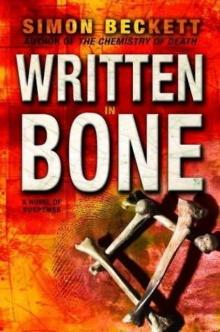 Written in Bone
Written in Bone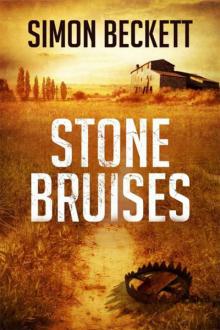 Stone Bruises
Stone Bruises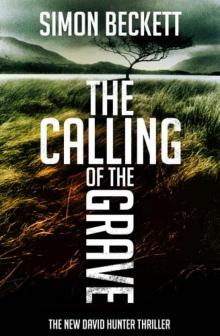 The Calling of the Grave
The Calling of the Grave Whispers of the Dead
Whispers of the Dead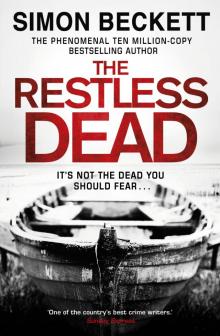 The Restless Dead
The Restless Dead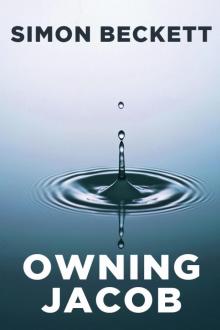 Owning Jacob
Owning Jacob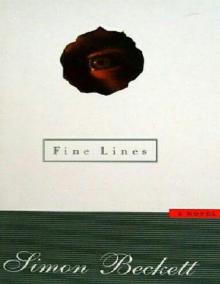 Fine Lines
Fine Lines Whispers of the Dead dh-3
Whispers of the Dead dh-3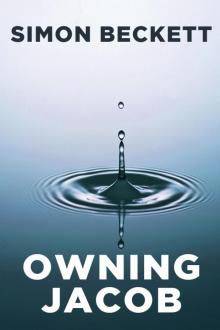 Owning Jacob (1998)
Owning Jacob (1998) Where There's Smoke (1997)
Where There's Smoke (1997)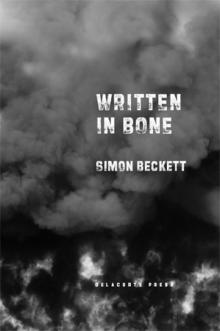 Written in Bone dh-2
Written in Bone dh-2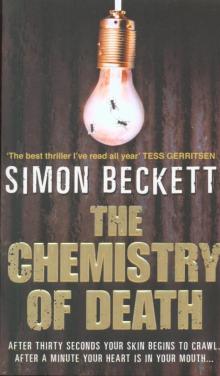 The Chemistry of Death dh-1
The Chemistry of Death dh-1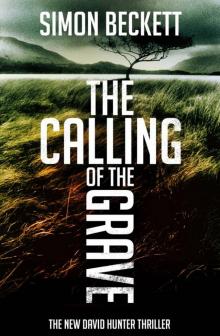 The Calling Of The Grave dh-4
The Calling Of The Grave dh-4